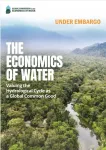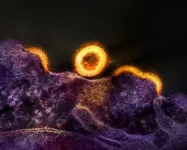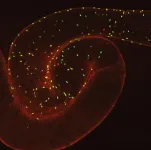(Press-News.org) Paris — An international group of leaders and experts warns that unless humanity acts with greater boldness and urgency, an increasingly out-of-balance water cycle will wreak havoc on economies and humanity worldwide.
In a landmark report, The Economics of Water: Valuing the Hydrological Cycle as a Global Common Good, the Global Commission on the Economics of Water says the water crisis puts at risk more than half of the world’s food production by 2050. It also threatens an 8% loss of GDP in countries around the world on average by 2050, with as much as a 15% loss in lower-income countries, and even larger economic consequences beyond.
Weak economics, destructive land use, and the persistent mismanagement of water resources have combined with the worsening climate crisis to put the global water cycle under unprecedented stress, the Commission says.
Nearly three billion people and over half of the world’s food production are in areas experiencing drying, or unstable trends in total water availability. Further, several cities are sinking due to the loss of water below the ground.
“Today, half of the world's population faces water scarcity. As this vital resource becomes increasingly scarce, food security and human development are at risk — and we are allowing this to happen,” observed Johan Rockström, Director of the Potsdam Institute for Climate Impact Research (PIK) and one of the Commission’s four co-chairs. “For the first time in human history, we are pushing the global water cycle out of balance. Precipitation, the source of all freshwater, can no longer be relied upon due to human caused climate and land use change, undermining the basis for human wellbeing and the global economy."
A new economics of water
The report argues that existing approaches have led to the water crisis. They ignore the multiple values of water across whole economies and in preserving nature’s critical ecosystems. The widespread under-pricing of water today also encourages its profligate use across the economy and skews the locations of the most water-intensive crops and industries, such as data centres and coal-fired power plants, to areas most at risk of water stress. Proper pricing, subsidies and other incentives must be used to ensure water is used more efficiently in every sector, more equitably in every population, and more sustainably.
“The global water crisis is a tragedy but is also an opportunity to transform the economics of water – and to start by valuing water properly so as to recognize its scarcity and the many benefits it delivers,” said Ngozi Okonjo-Iweala, Director General of the World Trade Organization and a co-chair of the Commission.
Current approaches also deal predominantly with the water we can see – the “blue water” in our rivers, lakes, and aquifers. They typically overlook a critical freshwater resource, namely “green water” – the moisture in our soils and plant life, which ultimately returns and circulates through the atmosphere, generating around half the rainfall we receive on land. A stable supply of green water is hence linked inextricably to stable patterns of rainfall, itself critical to economies and livelihoods. It also provides crucial support for the natural storage of carbon dioxide in the soil and mitigation of climate change.
The water challenge becomes even more pressing when we recognise how much water each person needs daily to live a dignified life. The Global Commission offers a new perspective on a just access to water: While 50 to 100 litres per day is required to meet essential health and hygiene needs, a dignified life – including adequate nutrition and consumption – requires a minimum of about 4,000 litres per person per day. Most regions cannot secure this much water locally. Although trade could help distribute water resources more equitably, it is hampered by misaligned policies and the water crisis itself.
The Commission argues that the crisis demands bolder, more integrated thinking, and a recasting of policy frameworks – in short, a new economics of water. It begins by recognising that the water cycle must now be governed as a global common good. This can only be done collectively, through concerted action in every country, through collaboration across boundaries and cultures, and for benefits that will be felt everywhere. Critically, we must redefine the way we value water properly to reflect its scarcity, while at the same time recognising the multiple benefits of water and a stable global hydrological cycle across economies. We must shape economies to allocate and use water properly from the start, and avoid having to fix problems such as water pollution and other “externalities” after the fact.
The report calls for a fundamental regearing of where water sits in economies, enabled by a “mission-driven” approach. This paradigm shift requires the participation of all stakeholders, from local to global, to achieve the missions that address the most important challenges of the global water crisis. Such missions would encourage innovations, capacity building and investments, and be evaluated not in terms of short-run costs and benefits but, rather, for how they can catalyse long-run, economy-wide benefits.
“We must move beyond a reactive market-fixing approach toward a proactive market-shaping one that catalyses mission-oriented innovation and builds symbiotic partnerships around our biggest water challenges. Only with a new economic mindset can governments value, govern, and finance water in a way that drives the transformation we need,” said Mariana Mazzucato, Professor at University College London where she is Founding Director of the UCL Institute for Innovation and Public Purpose (IIPP), and one of the co-chairs of the Commission.
The report recommends five such missions:
Mission 1: Launch a new revolution in food systems
Transform agriculture to sustain the planet by scaling up micro-irrigation and radically improving water productivity, reducing reliance on nitrogen-based fertilisers, spreading regenerative agriculture, and shifting progressively away from animal to plant-based diets.
Mission 2: Conserve and restore natural habitats critical to protecting green water
Conserve 30% of forests and restore 30% of degraded ecosystems by 2030. Priority should be given to protecting and restoring those areas that can best contribute to a stable water cycle.
Mission 3: Establish a circular water economy
Capture the full value of every drop by treating and reusing wastewater, reducing distribution inefficiencies and recovering valuable resources.
Mission 4: Enable a clean-energy and AI-rich era with much lower water intensity
Renewable energy, semiconductors and artificial intelligence (AI) are defining a new economic era. We must spur innovation with high ambitions and secure equity, sustainability and efficiency to ensure their growth does not exacerbate global water stresses or constrain the benefits they provide.
Mission 5: Ensure no child dies from unsafe water by 2030
Currently, over 1,000 children die every day from unsafe water. Ensure access to clean water for rural and hard-to-reach communities, including investing in decentralized water treatment and sanitation systems.
The Commission has identified critical enablers for the five missions, reflecting key aspects of this new way of governing, nationally and internationally to benefit people and the planet:
● Govern partnerships, property rights, and contracts for a just and sustainable water future Forge more symbiotic partnerships and address legacy water rights using conditionalities.
● Shape finance for a safe, just and sustainable water future
Address public and private underfunding; redirect harmful subsidies; establish “Just Water Partnerships” to design, implement and finance transition towards a just and safe water future in low- and lower-middle-income countries.
● Harness data as a foundation for action
Improve global water data infrastructure; promote corporate water footprint disclosure covering green and blue water, and value water as natural capital.
● Build global water governance
Create a multi-sectoral Global Water Pact to address both green and blue water challenges and stabilise the hydrological cycle.
A just and sustainable water future: How to turn the tide
The Report calls for governments across the world to deliver a “new course for water at every scale” and reinvigorate structures of international cooperation to address shared water challenges.
Tharman Shanmugaratnam, President of Singapore and one of the co-chairs of the Commission, said: “We can only solve this crisis if we think in much broader terms about how we govern water. By recognising water’s interactions with climate change and biodiversity. By mobilising all our economic tools, and both public and private finance, to innovate and invest in water. By thinking and acting multilaterally. So we not only save countless children’s lives and improve communities’ livelihoods today, but secure a much better and safer future everywhere.”
About the Global Commission on the Economics of Water
The Global Commission on the Economics of Water (GCEW) was convened in May 2022 at the initiative of the Government of the Netherlands as co-host of the UN 2023 Water Conference, with the aim of redefining the way we value and govern water for the common good, and completing the sustainability trilogy that began with the Stern Review on the Economics of Climate Change and the Dasgupta Review on the Economics of Biodiversity.
It is co-chaired by Mariana Mazzucato, Ngozi Okonjo-Iweala, Johan Rockström, and Tharman Shanmugaratnam, and comprises an independent and diverse group of experts from science, economics and policy-making, with leadership experience at community, city, national and multilateral levels.
The Co-Chairs and Commissioners contributed in their personal capacity, the views and recommendations of the GCEW do not necessarily reflect the opinions of their institutions and are independent of the Government of the Netherlands.
END
8% GDP loss by 2050 foreseen due to world water crisis; more than 50% of food production at risk: Global Commission on the Economics of Water
2024-10-16
ELSE PRESS RELEASES FROM THIS DATE:
Nanoparticle therapy offers new hope for prostate cancer patients
2024-10-16
Prostate cancer is the second leading cause of cancer death among American men.
A ground-breaking study, conducted by researchers from the University of Virginia, Mount Sinai, the University of Michigan, the University of Texas and others, has demonstrated the clinical success of a new nanoparticle-based, laser-guided therapy for prostate cancer treatment.
The study, which involved 44 men with localized prostate cancer, used gold nanoshellss in combination with magnetic resonance imaging (MRI) and ultrasound fusion — an ...
UVA researchers engineer AI breakthrough in human action detection technology
2024-10-16
What if a security camera could not only capture video but understand what’s happening — distinguishing between routine activities and potentially dangerous behavior in real time? That’s the future being shaped by researchers at the University of Virginia’s School of Engineering and Applied Science with their latest breakthrough: an AI-driven intelligent video analyzer capable of detecting human actions in video footage with unprecedented precision and intelligence.
The system, called the Semantic and Motion-Aware Spatiotemporal Transformer Network (SMAST), promises a wide range of ...
Bolstering the fight against antibiotic-resistant bacteria
2024-10-16
GAINESVILLE, Fla. — University of Florida Health scientists exploring how combinations of antibiotics can fight resistant bacteria have been awarded an $11.8 million grant for work that could help save the tens of thousands of lives lost yearly to infections that are increasingly plaguing humanity.
The National Institutes of Health, or NIH, grant to the UF College of Medicine and the UF College of Pharmacy will support scientists working to uncover the mechanics of how bacteria and antibiotics interact, down to the molecular level.
That mechanistic knowledge ...
Deep learning illuminates atmospheric blocking events of past, future
2024-10-16
Atmospheric blocking events are persistent, high-impact weather patterns that occur when large-scale high-pressure systems become stationary and divert the jet stream and storm tracks for days to weeks, and can be associated with record-breaking flooding or heat waves, such as in Europe in 2023. In a new study, University of Hawai‘i at Mānoa atmospheric scientist Christina Karamperidou used a deep learning model to infer the frequency of blocking events over the past 1,000 years and shed light on how future climate change may impact these significant phenomena.
“This study set out to extract a paleoweather signal from ...
Kidney transplantation among those with HIV infections shown safe and effective
2024-10-16
It is just as safe and effective for people with HIV in need of kidney transplantation to get their organ from donors who are also HIV positive as it is from donors who are not infected with the virus, a new study shows. Survival rates for organ recipients one and three years after the procedure were the same for donors with or without HIV. Also the same were risks of serious side effects, such as infection, fever, and rejection in the donated organ.
In what is the largest comparative trial of the experimental procedures since the first transplant was performed in the United States in 2016, researchers ...
Longer-term data from SWOG S1826 trial confirm nivolumab-AVD benefit in Hodgkin lymphoma
2024-10-16
In mid-2023, the SWOG S1826 phase 3 trial in advanced Hodgkin lymphoma reported highly positive primary results earlier than expected, after the trial’s second planned interim analysis found the preset threshold for efficacy had already been reached.
Now, a follow-up analysis with additional data – a median follow-up of 2.1 years – confirms the durability of those initial findings: among the 970 newly diagnosed adolescents and adults randomized to the trial, those who received a combination of nivolumab plus AVD chemotherapy (N-AVD) had a significantly lower risk of cancer progression ...
In landmark study, immunotherapy boosts survival of advanced Hodgkin lymphoma
2024-10-16
A treatment that rallies the immune system to destroy cancer raised the survival rate for advanced Hodgkin lymphoma patients to a remarkable 92 percent, suggesting a new standard therapy for the disease. The New England Journal of Medicine published the innovative clinical trial results this week.
Young people are most at risk to get Hodgkin lymphoma, an uncommon blood and immune system cancer that falls within the general category of lymphomas. With this new treatment, scientists believe they ...
Kidney transplantation between donors and recipients with HIV is safe
2024-10-16
WHAT:
Kidney transplantation from deceased donors with HIV (HIV D+) to recipients with HIV (HIV R+) was safe and comparable to kidney transplantation from donors without HIV (HIV D-) in a multicenter observational study in the United States. The clinical outcomes observed were consistent with smaller pilot studies, but this National Institutes of Health (NIH)-funded clinical trial was the first statistically powered to demonstrate noninferiority, which means that an approach being studied is as good as standard clinical practice. The results were published today ...
Brown researchers show how gut hormones control aging in flies and how it relates to human biology
2024-10-16
PROVIDENCE, R.I. [Brown University] — Biologists at Brown University have discovered how a neuropeptide hormone made in the gut of flies can control their lifespan.
The findings, published in PNAS, have implications for humans, too, the researchers say — especially as new diabetes and obesity medications based on gut hormones in the same family of the fly hormone are becoming more widespread.
For the past two decades, study author Marc Tatar, a professor of biology affiliated with the Center on the Biology of Aging at Brown University, has studied how the hormones insulin and insulin-like ...
Which clot-busting drug is tied to better recovery after stroke?
2024-10-16
EMBARGOED FOR RELEASE UNTIL 4 P.M. ET, WEDNESDAY, OCTOBER 16, 2024
MINNEAPOLIS – For people with ischemic stroke, treatment with the clot-busting drug tenecteplase is associated with a slightly higher likelihood of an excellent recovery and reduced disability three months later than the drug alteplase, according to a meta-analysis published in the October 16, 2024, online issue of Neurology®, the medical journal of the American Academy of Neurology. Researchers found that the likelihood of good recovery was similar ...





